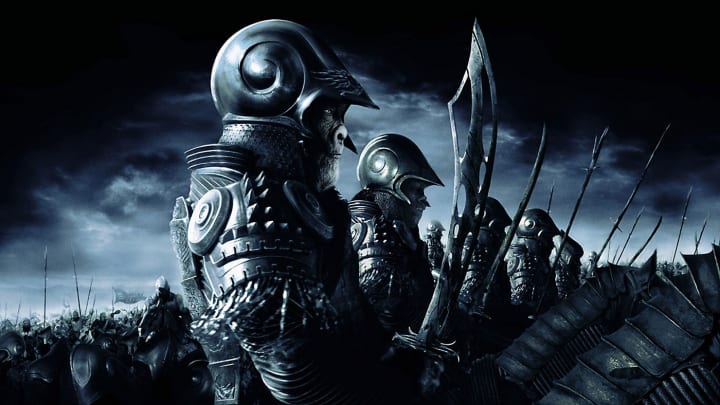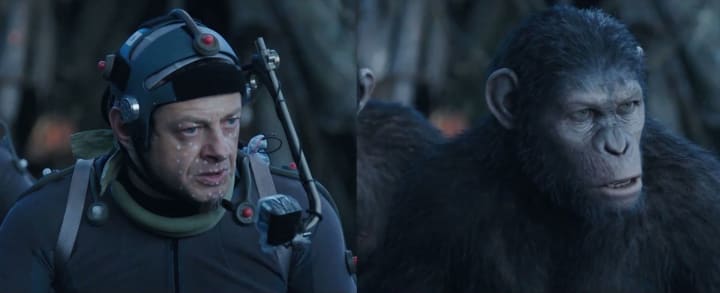
Tim Burton’s reimagining of Planet Of The Apes in 2001 will always serve as a ready example of why Hollywood reboots are often as forgettable as they are unnecessary. It failed to capture any of the social commentary intended by the originals. Filmed during the civil rights movement, Planet Of The Apes was a warning of sorts, as relevant today as it was then. This, in spite of all the love and artistry that went into making the film, is the extent of its legacy. Chalk it up to Mark Wahlberg’s wide-eyed performance, which in the larger context of his filmography makes The Happening look like a masterwork of cinema by comparison—or to the offensively absurd ending. Either way, you are unlikely to find anything redeeming whatsoever within the film’s tedious runtime.
These kinds of confused, played-too-safe efforts tend to earn a lot of money by catering to filmgoers’ nostalgia and then under-delivering on the promise of something worthy of the original source material; the movie industry has grown increasingly fond of this lucrative business model, frustrating though it may be.
At the heart of this half-century-old franchise lies a sort of bleak, post-Darwinian poetry: the notion that two distinct species of sufficiently advanced intelligence, however similar, cannot coexist on the same planet in the same moment. It’s the key cultural meme that permeates the pre-2011 Apes films: “The only good human is a dead human.” Owing as much to George Orwell’s Animal Farm as it does to the original ’63 Pierre Boulle novel, La Planète des singes, this conceit echoes the universal struggle between oppressed and oppressor—between those with vast, unthinking power and those who lack the capacity to overcome it.
Burton’s film seems a touch too preoccupied with the cutesy ironies that result from its central reversal, and as a result is rife with overtones of racialism, xenophobia, and even latent bestiality. (“No, I think I’ll stick with my chimps,” says one of Davidson’s coworkers aboard the Air Force space station in which the film’s clumsy opening sequence takes place, when asked whether she plans on ever getting an “actual boyfriend”).

But what keeps us coming back to this mythology, I think, are the themes explored so richly in Rupert Wyatt’s inspired 2011 Rise of the Planet of the Apes. A starkly different kind of film, which manages at once to reintroduce the world to its larger, established franchise, while also maintaining a sense of novelty and relevance to contemporary audiences. Through Caesar’s viewpoint, we are made to empathize with the apes like never before, as they gradually make preparations to escape their abusive habitat and seek refuge and freedom in the wild.
Let’s not forget, of course, that Rise of the Planet of the Apes also presents the first hard-science explanation for the uplifting of common primates to a level of sentience comparable to that of the average human being. By exploring the human struggle alongside Caesar’s journey, we see that each side has its reasons for the distrust and that ultimately leads to the sort of mutual, militant hatred glimpsed in the series’ 1968 original, starring Charlton Heston, and its handful of lesser sequels.
Andy Serkis’ MoCap performance in this entry is arguably the best in the franchise’s long, venerable history. And James Franco, delivering a solid performance, lends heart and believability to scientist Will Rodman, who spends most of the film’s plot trying to reverse his father’s dementia by developing a viral compound to pinpoint and repair damaged tissue in the human brain, effectively curing Alzheimer’s Disease and other neurodegenerative disorders.

via Film Takeout
There’s little doubt that Dawn of the Planet of the Apes continued to deepen and complicate the human/simian dynamic introduced in Wyatt’s brilliant 2011 reboot. Having established that a manned mission to Mars on the eve of the ALZ-113, or “Simian Flu,” pandemic gone awry (a headline in the San Francisco Chronicle reads, lost in space?), we can probably assume that this new timeline intends to leave at least some of the original series’ tent pole moments intact.
As a species, making war is something we’ve gotten pretty good at. It stands to reason that, when the threat of extinction rears its head, talk of machine-guns and rocket launchers and C-4 will follow soon enough. It’s why the United States and its allies invade nations and topple dictatorships so routinely: We don’t like the possibility of another group controlling the resources we depend on, or overstepping established territorial boundaries—as a country, we’ve killed for far less.
The idea that our world’s leaders might have questionable intentions when it comes to warfare is something that, while pretty incendiary as a matter of public discourse, has been examined in post-9/11 art and cinema with relative frequency. Films like Green Zone (2010, Greengrass) and Zero Dark Thirty (2012, Bigelow) set their sights on issues of falsified intelligence, torture, surveillance—and war as something governments and high-profit industries manufacture deliberately for monetary gain.
Science fiction has also taken a number of stabs at this sort of subject matter in the recent past, and most have come across as admirable in their ambitions, regardless of critical success: Star Trek Into Darkness (’13), A Scanner Darkly (’06), The Dark Knight (’08). There exists a pervasive understanding in this country that privacy is a thing of the recent past, handed over at will to powerful people ranging from Mark Zuckerberg to the more proactive members of the Bush administration. Films like Christopher Nolan’s have done a fine job of exploring this problem.
Never sacrificing the needs of the story at hand to make a political point, however, Matt Reeves achieves a new standard for complexity and nuance in contemporary sci-fi cinema. One surprise standout character is Koba, an ape held captive and tortured by the very same Gen-Sys Laboratories researchers who created the Simian Flu and wiped out much of humanity in the previous film, Rise, several years earlier. A reluctant but helpful ally to Caesar in Rupert Wyatt’s 2011 entry, Koba’s tendencies for violence and deceit bubble to the surface in this tremendously successful, heartfelt sequel.
While we are made to empathize with his hatred toward human beings, Reeves ultimately shows us that Kobais incapable of devotion to anyone or anything beyond his own selfish hunger for vengeance, given the harm inflicted on him in the past. And this is an important and understated facet of warfare in the modern age: Our cultures and nations are hesitant to cop to anything resembling forgiveness for the crimes and injustices of the previous century, and it eats at our global civilization like a cancer.
Caesar, by contrast, is steadfast in his belief that peace is the solution to most of our problems—and no wrongdoing is so severe that an entire race should be made to suffer for it. No doubt the third film in this newly rebooted incarnation of the Apes saga will present a far more cynical version of the creature Andy Serkis has portrayed twice with such groundbreaking skill and finesse. Along with the apes who stand beside him—Maurice, Rocket, his own growing family—Caesar represents the very antithesis of the human-loathing, slavekeeping apes first seen in Franklin J. Schaffner’s original 1968 masterpiece. I fear the weary leader shall eventually be made to suffer for the goodness in his heart.
Overall, the film is an emotional and technical marvel. Its visual effects are used sparingly in light of the MoCap work done by Weta Digital on Serkis’s and the other apes’ performances. Several tense fight sequences serve as tentpole moments to delineate the quieter, more universal tragedies and debates that propel the plot along—but audiences can rejoice at being spared the kind of ludicrous, explosion-riddled battle scenes that plague most summer blockbusters of late. Jason Clarke, Keri Russell, Gary Oldman, and KodiSmit-McPhee (no longer the child actor you remember from The Road and Reeves’s own sublime horror film Let Me In) round out a stellar cast that nevertheless surrenders most of its camera time to the scene-stealing apes. I dare say that Dawn can easily be called The Empire Strikes Back of this generation, and, outside of a few high-concept outliers like Source Code and Inception, is perhaps the single greatest science fiction movie of the decade.

via Collider
I think it’s also safe to say that we won’t likely see the Icarus spacecraft anytime soon. Dawn had more than a few climactic surprises up its sleeve, given the amount of storytelling ground covered by its predecessor. The straightforward, armed combat between apes and humans following a few well-meaning individuals’ failed attempts at peacekeeping felt like a perfect extension of the 2011 narrative. While the first two Apes entries toyed with audiences’ cultural anxieties about the Bomb, I’d expect the next two sequels to employ destruction on a global scale in keeping with the post-9/11 zeitgeist.
Perhaps near-future tech involved in climateering, which we’ve seen handled well in “cli-fi” technothriller novels but rarely on the big screen, will become weaponized by Caesar’s resistance as a last-ditch effort at survival. Or perhaps the film will explore new modes of urbanized living, given the dramatic shift toward a small, endangered human population, that more readily benefit the apes. It’d be quite nice to see arcology and green initiatives play a role in the Apes mythos, in light of changing ideas about climate change, Earth’s biosphere, modern apocalyptic realities, and neo-futurism.
Whatever path director Matt Reeves, along with screenwriter Mark Bomback and a truly phenomenal cast that includes Jason Clarke (Zero Dark Thirty) and Keri Russell (August Rush), ultimately chooses . . . well, it’s safe to say we’re likely to be spared another atrocity like Burton’s 2001 contribution, which I hesitate to dignify with its unearned, studio-given title. But that’s putting it all a bit too cynically. In truth, the franchise’s future has only brightened following the release of Rise of the Planet of the Apesthree years back, and I look forward to seeing where Andy Serkis’s Caesar takes us.
As a species, making war is something we’ve gotten pretty good at. It stands to reason that, when the threat of extinction rears its head, talk of machine-guns and rocket launchers and C-4 will follow soon enough. It’s why the United States and its allies invade nations and topple dictatorships so routinely: We don’t like the possibility of another group controlling the resources we depend on, or overstepping established territorial boundaries—as a country, we’ve killed for far less.
The idea that our world’s leaders might have questionable intentions when it comes to warfare is something that, while pretty incendiary as a matter of public discourse, has been examined in post-9/11 art and cinema with relative frequency. Films like Green Zone (2010, Greengrass) and Zero Dark Thirty (2012, Bigelow) set their sights on issues of falsified intelligence, torture, surveillance—and war as something governments and high-profit industries manufacture deliberately for monetary gain.

via Bleeding Cool
Science fiction has also taken a number of stabs at this sort of subject matter in the recent past, and most have come across as admirable in their ambitions, regardless of critical success: Star Trek Into Darkness (’13), A Scanner Darkly (’06), The Dark Knight (’08). There exists a pervasive understanding in this country that privacy is a thing of the recent past, handed over at will to powerful people ranging from Mark Zuckerberg to the more proactive members of the Bush administration. Films like Christopher Nolan’s have done a fine job of exploring this problem.
Never sacrificing the needs of the story at hand to make a political point, however, Matt Reeves achieves a new standard for complexity and nuance in contemporary sci-fi cinema. One surprise standout character is Koba, an ape held captive and tortured by the very same Gen-Sys Laboratories researchers who created the Simian Flu and wiped out much of humanity in the previous film, Rise, several years earlier. A reluctant but helpful ally to Caesar in Rupert Wyatt’s 2011 entry, Koba’s tendencies for violence and deceit bubble to the surface in this tremendously successful, heartfelt sequel.
While we are made to empathize with his hatred toward human beings, Reeves ultimately shows us that Kobais incapable of devotion to anyone or anything beyond his own selfish hunger for vengeance, given the harm inflicted on him in the past. And this is an important and understated facet of warfare in the modern age: Our cultures and nations are hesitant to cop to anything resembling forgiveness for the crimes and injustices of the previous century, and it eats at our global civilization like a cancer.
Caesar, by contrast, is steadfast in his belief that peace is the solution to most of our problems—and no wrongdoing is so severe that an entire race should be made to suffer for it. No doubt the third film in this newly rebooted incarnation of the Apes saga will present a far more cynical version of the creature Andy Serkis has portrayed twice with such groundbreaking skill and finesse. Along with the apes who stand beside him—Maurice, Rocket, his own growing family—Caesar represents the very antithesis of the human-loathing, slavekeeping apes first seen in Franklin J. Schaffner’s original 1968 masterpiece. I fear the weary leader shall eventually be made to suffer for the goodness in his heart.
Overall, the film is an emotional and technical marvel. Its visual effects are used sparingly in light of the MoCap work done by Weta Digital on Serkis’s and the other apes’ performances. Several tense fight sequences serve as tentpole moments to delineate the quieter, more universal tragedies and debates that propel the plot along—but audiences can rejoice at being spared the kind of ludicrous, explosion-riddled battle scenes that plague most summer blockbusters of late. Jason Clarke, Keri Russell, Gary Oldman, and KodiSmit-McPhee (no longer the child actor you remember from The Road and Reeves’s own sublime horror film Let Me In) round out a stellar cast that nevertheless surrenders most of its camera time to the scene-stealing apes. I dare say that Dawn can easily be called The Empire Strikes Back of this generation, and, outside of a few high-concept outliers like Source Code and Inception, is perhaps the single greatest science fiction movie of the decade.
About the Creator
Alex Kane
Freelancer, plays too many first-person shooters, and blogs about culture and technology. Stories in Spark, Digital Science Fiction, and Futuredaze.






Comments
There are no comments for this story
Be the first to respond and start the conversation.